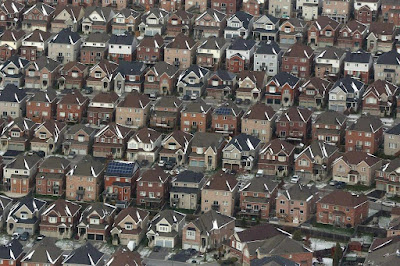Sure We've Got a Housing Crisis. Now Do Something About It.
There's an affordable housing problem in Canada. It's a problem that has confronted other countries also and they have shown us how to fix it. Hint: the answer isn't building more houses. You have to start by attacking the rot.
New data from Statistics Canada shows multiple-property owners held between 29 and 41 per cent of the housing stock in Ontario, British Columbia, Nova Scotia and New Brunswick in 2019 and 2020.The data from the Canadian Housing Statistics Program, which includes both residential and recreational holdings, reveals multiple-property ownership accounted for 41 per cent of Nova Scotia’s housing stock, 39 per cent of New Brunswick’s, 31 per cent of Ontario’s and 29 per cent of British Columbia’s.
The problem? Allowing housing to become a commodity of trade and a convenient place for newcomers to bury money. What to do?
I believe it was Sweden that first tackled the problem by declaring housing a human right, not a speculative commodity. Tax away the gains from housing properties that are not primary residences. This includes the number of houses in Vancouver that stand vacant. That sounds drastic but it can work.


Here's another solution from a country that solved housing a long time ago: Japan.
ReplyDeleteIt's just too lucrative and profitable for developers to produce only single family housing. Everything else is just ignored. And costs down the line become incredibly onerous once the bills for maintenance on roads, pipes, and transmission are due.
I'm hoping for my community to avoid this fate. We need to switch operating our community like a township rather than a suburb, cause they're goddamn expensive.
Hey, Troy. Thanks for the links. Could you imagine, Japanese-style, national zoning regulation? Imagine how that might sever lucrative ties between local and provincial politicians and developers.
ReplyDeleteSingle family housing is now the preserve of municipalities that have abundant land. Drive down Cambie Street and you'll see how those former neighbourhoods have been given to condo development.
We need better housing policy but I don't see the political will or public demand for it. Your community, I expect, has greater flexibility.
Hope all's well. Have you dodged Covid so far?
"We need better housing policy but I don't see the political will or public demand for it."
ReplyDeleteThe same political will that is missing around, for example, climate-denial and hiding salmon-farm plagues?
In the 1920s, Amsterdam city council was taken over by the socialists.
They built 'Het Schip, a complex of houses for industry workers in the Spaarndammerbuurt quarter of Amsterdam'.
They used the top architects at the time, to build in the same iconic and beautiful style as the homes of the rich people.
"The apartments of Het Schip were a radical departure from the poor living conditions of many of Amsterdam's working-class people in the 20th century. Relatively spacious, they include several separate rooms as opposed to the one-room dwellings still common at the time. They also included flush toilets and had ample natural light and ventilation from windows. Ground-floor apartments also had gardens."
A sad footnote: Last time I was there I saw 'Te-koop' (for sale) signs in the neigbourhood. Apparently the housing coop is short of funds and the only way to survive is to slowly sell itself out of existence.
Only the end of capitalism and 'private real estate' will solve this multi-layered clusterfuck we've created. If we survive that long.
I'm not sure we can visualize the sort of change that's required, NPoV. We're timid, suspicious of change, whether it's electoral reform, the climate crisis, housing, just about anything.
ReplyDeleteInteresting Blog
ReplyDeleteVisit Us
Best mortgage consultant in Surrey